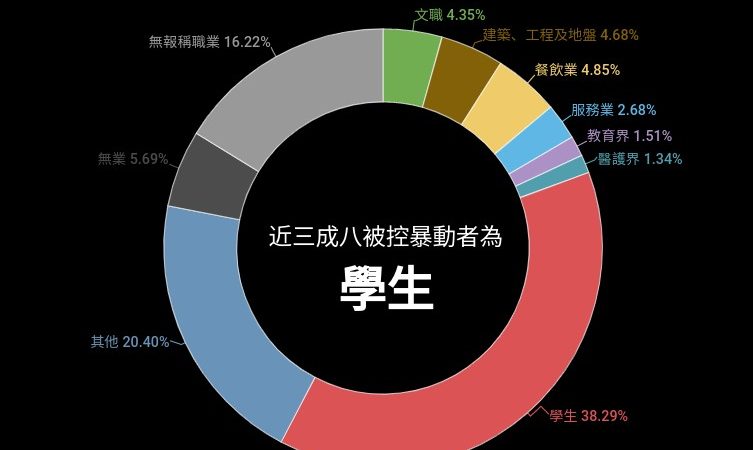Defendants can expect six to 10 years in jail unless they plead guilty
Hong Kong's anti-China extradition protests are now a year old. Hong Kong online media outlet Stand News curated a series of articles to reflect on the opposition movement. Global Voices is publishing edited versions of these posts under a content partnership agreement. The original Chinese report below was published on June 12 2020 on the Stand News.
A key turning point of the Hong Kong anti-extradition movement in 2019 was the June 12 protests that took place near the Legislative Council.
In order to stop the Legislative Council (Legco) from enacting the Fugitive Offenders and Mutual Legal Assistance in Criminal Matters Legislation (Amendment) Bill 2019, better known as the China extradition bill, tens of thousands peaceful protesters gathered outside government headquarters. Later that afternoon, a minority of the protesters attempted to charge the Legco building.
In response, riot police indiscriminately deployed tear gas and rubber bullets to disperse the protesters, including against those situated in peaceful sit-in areas.
On the same day, Stephen Lo, the city's then-police commissioner, defined the June 12 protests as a “riot”, implying that those who participated could be subjected to a charge carrying a maximum term of 10 years in jail.
Chief Executive Carrie Lam stood by the commissioner's judgement and the riot label. However, a majority of Hong Kong citizens disagreed with the definition.
Four days later, on June 16, two million HongKongers took to the street chanting slogans that included “students are not rioters”, “we are not rioting”. The five major demands of the anti-extradition movement also included “the withdrawal of the riot label”.
However, the government has not responded to the demands and protesters continue striking. The number of arrested protesters continues to rise.
The Stand News submitted an inquiry about the number of arrests to the police authority.
Between June 9, 2019 and May 31, 2020, Hong Kong police arrested 8,986 individuals during protests. So far, the department of justice has pressed charges against 1,808 protesters and the most frequent charge is “rioting”.
In one court case heard at a district court on May 4, a 21-year-old lifeguard who participated in the June 12 protest pleaded guilty to a charge of rioting.
The magistrate stressed that the anti-extradition protesters “directly undermined the rule of law” and “disregard law and the safety of police officers.” As a result, the sentence has to take account of public interest and act as a deterrent to future crimes, the magistrate said.
The starting point for riot charge sentencing is six-year-imprisonment. However, as the defendant pleaded guilty, the sentence was reduced to four years in jail.
The 612 individuals presently facing rioting charges will have to go through similar judicial processes.
Once they are found guilty, they will have to spend a few years of their youth in jail, their plans for the future put on hold.
Below is an infographic of the age profile of 598 “rioters” who have their cases registered at courts (14 of the 612 cases have not reached court yet).

Age 11-15 (14 cases); Age 16-20 (207 cases); Age 21-30 (324 cases); Age 31-40 (37 cases); Age 41-50 (11 cases; Age 51 and above (2 cases). Image from the Stand News.
The average age of defendants is 23. The oldest is 61 and the youngest just 13. Fourteen of the “rioters” are under 16-years-old. Around a third are younger than 20.
The infographic below shows that just over 38% of the “rioters” are students:

Student: 38.29%; Catering sector: 4.85%; Construction sector: 4.68%; White collar: 4.35%; Service sector: 2.68%; Education sector: 1.51%; Medical sector: 1.34%; Others: 20.40%; Unemployed: 5.69%; None disclosed: 16.22%
Below is a breakdown of their arrests.
More than 46% of the arrests took place during violent clashes between protesters and riot police at the Polytechnic University on November 18, 2019:
June 12 2019, protests outside legislative council — 1 case
June 26 2019, protests outside the Police Headquarter — 1 case
July 14 2019, clashes with police in Shatin — 3 cases
July 28 2019, protests in Western Hong Kong island district — 42 cases
August 5 2019, clashes with police in Wong Da Sin district — 1 case
August 11 2019, clashes outside Tsim Sha Tsui police station — 29 cases
August 13 2019, peaceful sit-in at Hong Kong International airport — 3 cases
August 24 2019, protests in Kwun Tong district — 3 cases
August 29 2019, protests outside Shum Shui Po police station — 17 cases
August 31 2019, protests in Hong Kong Island district — 17 cases
September 7 2019, clashes at Shatin Metro station — 2 cases
September 21 2019, assembly at Yuen Long Metro station — 3 cases
September 21 2019, protests in Tuen Mun district — 1 cases
September 22 2019, shopping mall protests in Shatin — 3 cases
September 22 2019, clashes outside Mongkok police station — 2 cases
September 29 2019, protests at Admiralty district — 99 cases
October 1 2019, China national day, guerrilla-style protests in various districts across Hong Kong — 49 cases
October 6 2019, protests against mask ban — 28 cases
October 13 2019, protests in Tseung Kwan O district — 2 cases
November 3 2019, clashes in Mongkok — 1 case
November 10 2019, clashes in Mongkok — 1 case
November 11 2019, road block action at Chinese University of Hong Kong — 9 cases
November 13 2019, road block action in Sheung Shui district — 2 cases
November 16 2019, clashes in Mongkok — 6 cases
November 18 2019, police siege of the Ploytechnic University — 284 cases
January 19 2020, assembly at Central district — 3 cases

Post a Comment